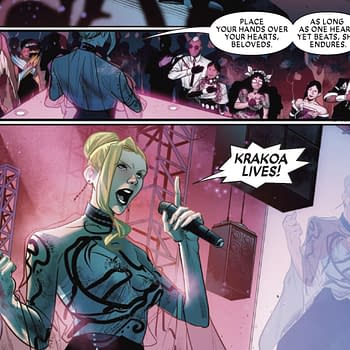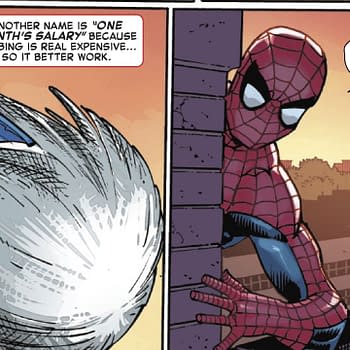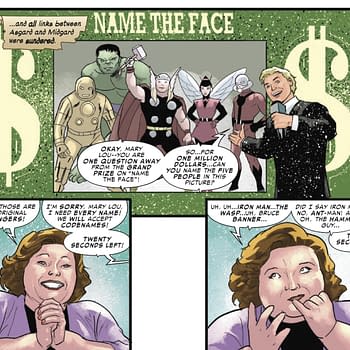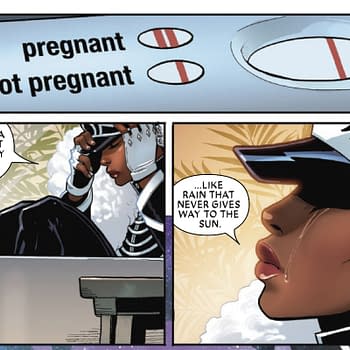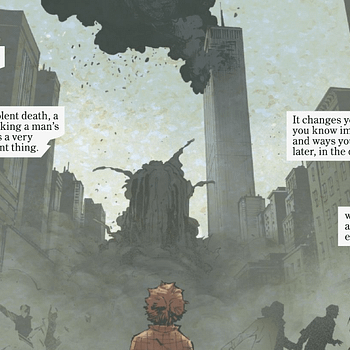Posted in: Comics, Halloween, Recent Updates | Tagged: age of ultron, battleworld, Comics, entertainment, Hank Johnson Agent of Hydra, Marvel Comics, miracleman, Secret Wars, squadron sinister, thors
Thor's Comic Review Column: Miracleman #1, Hank Johnson: Agent Of Hydra #1, Squadron Sinister #3, Age Of Ultron Vs. Marvel Zombies #4, Hail Hydra! #2, Thors #3
This Week's Reviews:
Miracleman #1
Hank Johnson, Agent of Hydra #1
Squadron Sinister #3
Age of Ultron vs Marvel Zombies #4
Hail Hydra! #2
Thors #3
Miracleman by Gaiman and Buckingham #1
By Adam X. Smith

The first issue of Gaiman's run on Miracleman, then, shows the value of approaching this technique from the opposite direction – telling a one-shot story, from the perspective of an outsider, that still enriches our understanding of the core character despite them not featuring as a protagonist or even all that much in the story.
In the first story of "Book Four: The Golden Age", it is the year of my birth, 1987, and for the past two years Miracleman, having stepped out into the public and brought about world peace following Kid Miracleman's razing of London, has lived atop his towering pyramid Olympus as a for-all-intents-and-purposes living god. So great have been his achievements over so short a time that there are now pilgrimages to see him in order to seek wisdom or favour. One such pilgrimage sees a man climb the vertiginous heights of the pyramid as part of a party of four, each with a singular goal. The climb tests each of them mentally and physically. One of their party goes mad and plunges to his death. Another, upon reaching the end, attempts first to kill Miracleman, fails, and turns the gun on themselves. Another wishes to be an artist, a request Miracleman grants. But when the protagonist asks him to save his comatose daughter from imminent death, Miracleman impassively refuses. As the broken man is forced to climb back down, it is left ambiguous as to his fate.
Instantly distinct from the previous run by Alan Moore and John Totleben et al by its eschewing of thick lines and defined forms, Mark Buckingham's Golden Age is one of more expressionist, dream-like images replete with cross-hatching and rough pencils lines, augmented by D'Israeli's colours, which rum the gamut from bronze and steel blue pastels in the prologue, through acid-trip fluorescence and cut-up during the climb to a more conventional pen-and-ink at the summit.
Ultimately, this is one of the clearest, most confident examples of how one approaches a continuation of a book beyond the dissolution of the original creative team. Moore's run concludes with Miracleman having established his utopia on Earth and ascending to post-secular godhood, albeit not without a glimpse at what it costs him as a man; that Moore chose to leave the story on this note is indicative of him being unable to or disinterested in seeing where the story of a man who becomes God goes from there – Watchmen, likewise, concludes with Doctor Manhattan leaving Earth to seek out life and even create some of his own in the vastness of space. Gaiman, by contrast, has long had a literary fascination with exploring what it means to be a god, or something just as or more powerful, and how that reflects our own ideas about theology, mythology and contemporary culture. If there were any safer hands to pass the Miracleman torch to, I can't think of them, and I continue to follow the series with curiosity and intrigue at what comes next.
Suck it, Todd MacFarlane.
Adam X. Smith will be graduating from university this week, will be returning to study for his Master's degree shortly after, and is currently scoping out landmarks in the surrounding countryside to use as potential abduction sites for his alien masters to start experimenting on the locals. He also writes stuff for @ElectrolyteMag when he's not designing doomsday devices or watching Archer and Steven Universe.
Hank Johnson, Agent of Hydra #1 (Marvel, $3.99)
By Cat Taylor

I feel confident that the main reason this comic works so well as a comedy set in a super-hero universe is because the writer, David Mandel, is both a comics fan and has experience as executive producer on Seinfeld and Curb Your Enthusiasm, two of the best and funniest comedies ever on television. Although, even as I say that, I have to acknowledge that I have probably seen more writers fail than succeed when moving from television to comics or vice-versa, but this one is a clear success. The basic premise of this story is the life of one of those low-level Hydra agents you see as cannon fodder in every other comic. That agent is Hank Johnson, and not Bob, to the disappointment of many readers. However, Mandel did pitch this idea to Marvel about twenty years ago.
So, he had the concept before Bob ever came along. Someone else just had the luck of getting Bob published in a comic book appearance first. Regardless, this comic really works as it follows Hank's life with his family and friends and his work for Hydra as a day job. Although the comic book this is closest to in plot and concept is the excellent but little known independent comic, Henchmen, the overall style of the art and writing reminds me of Keith Giffen's Justice League, which I can never praise highly enough. Speaking of the art, and the Justice League comparison in particular, Michael Walsh, who is best known for his work on Secret Avengers, draws a lot like Justice League's Kevin Maguire. It's a simple, non-flashy style that emphasizes the more mundane aspects of his characters and especially focuses on priceless facial expressions that contribute an extra dimension to the comedy and story-telling.
Of course, the nature of someone's job with a terrorist organization bent on world domination being treated like an episode of the Office is the kind of humor that practically writes itself if you have an offbeat sense of humor similar to mine. On the other hand, since we are living in the age of outrage, I've already read several online rants saying that treating a "Nazi" organization like Hydra as a medium for comedy isn't funny. Well, to me the fact that it's kind of wrong makes it that much funnier, much like the more uncomfortable episodes of Curb Your Enthusiasm or Family Guy. Seriously, would a concept like this be even half as funny if Hank Johnson worked for S.H.I.E.L.D.? However, if it helps make some people more comfortable, the point has been made that Hydra is NOT a Nazi organization in the modern Marvel comic book universe, AND that Hank Johnson, Agent of Hydra's, writer is Jewish.
In conclusion, I am really looking forward to the next issue of this comic. Wait, what's that? This is only a one-shot? NOOOOO!!!!!! How could they? This comic has so much potential and is so different from the rest of Marvel's line, why stop after only one issue? Hopefully, sales and popularity will prove that the loser as a character, Hank Johnson, is a winner as a series and that this will become an ongoing title in the resurrected Marvel Universe. Either that or maybe Hydra Bob will get his own series after all. Come on, fellow fanboys, help me out. Pick this up and let's get this on the new Marvel schedule.
Cat Taylor has been reading comics since the 1970s. Some of his favorite writers are Alan Moore, Neil Gaiman, Peter Bagge, and Kurt Busiek. Prior to writing about comics, Taylor performed in punk rock bands. Now instead of weekends playing in clubs across the United States, he goes grocery shopping, cleans the house, and writes these reviews. It's pretty exciting. You can e-mail Cat at cizattaylor@hotmail.com.
Jeb D. Continues to Breach the Battleworld
Squadron Sinister #3 (Marvel, $3.99)

Age of Ultron vs Marvel Zombies #4 (Marvel, $3.99)

Hail Hydra! #2 (Marvel, $3.99)

Thors #3 (Marvel, $3.99)

Jeb D. wishes everyone a happy Labor Day, and if there were enough mesquite smoked ribs, he'd share them. But there aren't.











